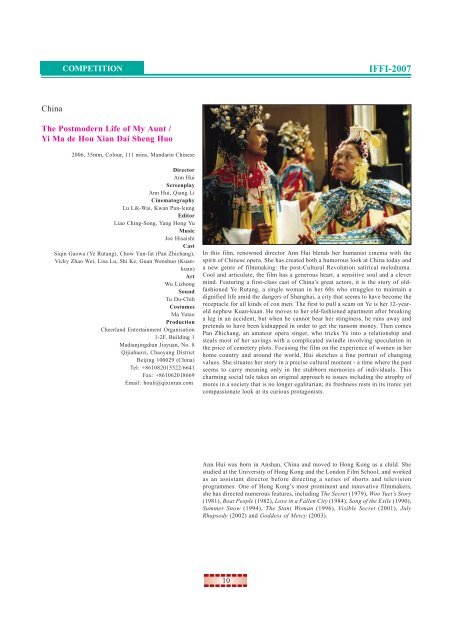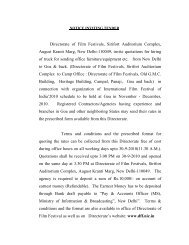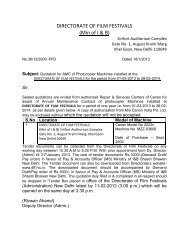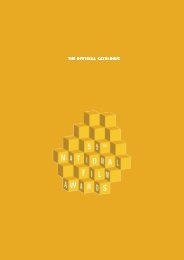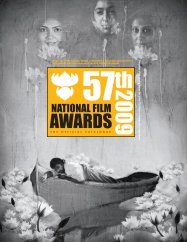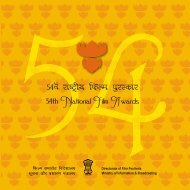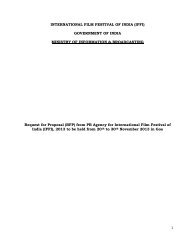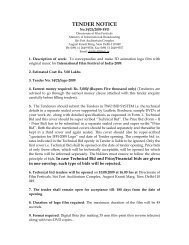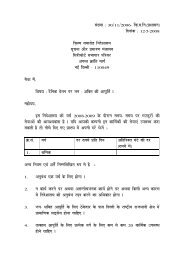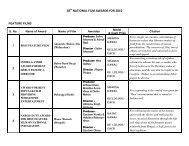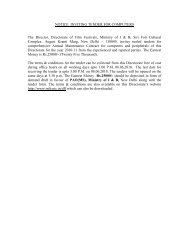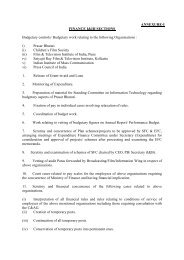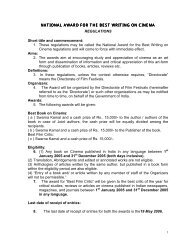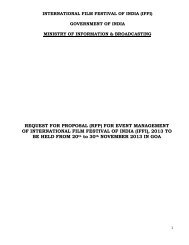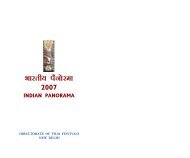Birth Centenaries - Directorate of Film Festivals
Birth Centenaries - Directorate of Film Festivals
Birth Centenaries - Directorate of Film Festivals
Create successful ePaper yourself
Turn your PDF publications into a flip-book with our unique Google optimized e-Paper software.
China<br />
COMPETITION<br />
The Postmodern Life <strong>of</strong> My Aunt /<br />
Yi Ma de Hou Xian Dai Sheng Huo<br />
2006, 35mm, Colour, 111 mins, Mandarin Chinese<br />
Director<br />
Ann Hui<br />
Screenplay<br />
Ann Hui, Qiang Li<br />
Cinematography<br />
Lu Lik-Wai, Kwan Pun-leung<br />
Editor<br />
Liao Ching-Song, Yang Hong Yu<br />
Music<br />
Joe Hisaishi<br />
Cast<br />
Siqin Gaowa (Ye Rutang), Chow Yun-fat (Pan Zhichang),<br />
Vicky Zhao Wei, Lisa Lu, Shi Ke, Guan Wenshuo (Kuankuan)<br />
Art<br />
Wu Lizhong<br />
Sound<br />
Tu Du-Chih<br />
Costumes<br />
Ma Yutao<br />
Production<br />
Cheerland Entertainment Organisation<br />
1-2F, Building 1<br />
Madianjingdian Jiayuan, No. 8<br />
Qijiahuozi, Chaoyang District<br />
Beijing 100029 (China)<br />
Tel: +861082015522/6641<br />
Fax: +861062018669<br />
Email: houli@qixinran.com<br />
10<br />
IFFI-2007<br />
In this film, renowned director Ann Hui blends her humanist cinema with the<br />
spirit <strong>of</strong> Chinese opera. She has created both a humorous look at China today and<br />
a new genre <strong>of</strong> filmmaking: the post-Cultural Revolution satirical melodrama.<br />
Cool and articulate, the film has a generous heart, a sensitive soul and a clever<br />
mind. Featuring a first-class cast <strong>of</strong> China’s great actors, it is the story <strong>of</strong> oldfashioned<br />
Ye Rutang, a single woman in her 60s who struggles to maintain a<br />
dignified life amid the dangers <strong>of</strong> Shanghai, a city that seems to have become the<br />
receptacle for all kinds <strong>of</strong> con men. The first to pull a scam on Ye is her 12-yearold<br />
nephew Kuan-kuan. He moves to her old-fashioned apartment after breaking<br />
a leg in an accident, but when he cannot bear her stinginess, he runs away and<br />
pretends to have been kidnapped in order to get the ransom money. Then comes<br />
Pan Zhichang, an amateur opera singer, who tricks Ye into a relationship and<br />
steals most <strong>of</strong> her savings with a complicated swindle involving speculation in<br />
the price <strong>of</strong> cemetery plots. Focusing the film on the experience <strong>of</strong> women in her<br />
home country and around the world, Hui sketches a fine portrait <strong>of</strong> changing<br />
values. She situates her story in a precise cultural moment - a time where the past<br />
seems to carry meaning only in the stubborn memories <strong>of</strong> individuals. This<br />
charming social tale takes an original approach to issues including the atrophy <strong>of</strong><br />
mores in a society that is no longer egalitarian; its freshness rests in its ironic yet<br />
compassionate look at its curious protagonists.<br />
Ann Hui was born in Anshan, China and moved to Hong Kong as a child. She<br />
studied at the University <strong>of</strong> Hong Kong and the London <strong>Film</strong> School, and worked<br />
as an assistant director before directing a series <strong>of</strong> shorts and television<br />
programmes. One <strong>of</strong> Hong Kong’s most prominent and innovative filmmakers,<br />
she has directed numerous features, including The Secret (1979), Woo Yuet’s Story<br />
(1981), Boat People (1982), Love in a Fallen City (1984), Song <strong>of</strong> the Exile (1990),<br />
Summer Snow (1994), The Stunt Woman (1996), Visible Secret (2001), July<br />
Rhapsody (2002) and Goddess <strong>of</strong> Mercy (2003).


